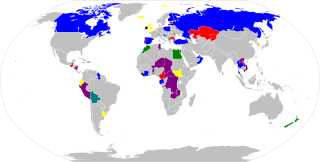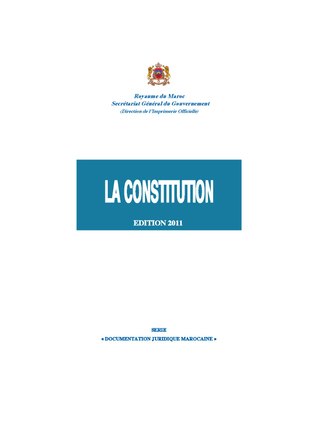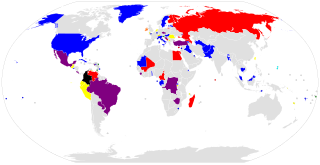 |
|---|
 |
|---|
A constitutional referendum was held in French Dahomey and French Togoland on 5 May 1946 as part of the wider French constitutional referendum. The new proposed new constitution was rejected by 55% of voters, with a turnout of 57%. [1]
 |
|---|
 |
|---|
A constitutional referendum was held in French Dahomey and French Togoland on 5 May 1946 as part of the wider French constitutional referendum. The new proposed new constitution was rejected by 55% of voters, with a turnout of 57%. [1]
| Choice | Votes | % | |
|---|---|---|---|
| For | 373 | 44.62 | |
| Against | 463 | 55.38 | |
| Total | 836 | 100.00 | |
| Valid votes | 836 | 98.12 | |
| Invalid/blank votes | 16 | 1.88 | |
| Total votes | 852 | 100.00 | |
| Registered voters/turnout | 1,502 | 56.72 | |
| Source: Sternberger et al. | |||

The president of France, officially the president of the French Republic, is the executive head of state of France, and the commander-in-chief of the French Armed Forces. As the presidency is the supreme magistracy of the country, the position is the highest office in France. The powers, functions and duties of prior presidential offices, in addition to their relation with the prime minister and government of France, have over time differed with the various constitutional documents since the Second Republic.

The Fifth Republic is France's current republican system of government. It was established on 4 October 1958 by Charles de Gaulle under the Constitution of the Fifth Republic.
A constitutional amendment is a modification of the constitution of a polity, organization or other type of entity. Amendments are often interwoven into the relevant sections of an existing constitution, directly altering the text. Conversely, they can be appended to the constitution as supplemental additions, thus changing the frame of government without altering the existing text of the document.

The current Constitution of France was adopted on 4 October 1958. It is typically called the Constitution of the Fifth Republic(French: la Constitution de la Cinquième République), and it replaced the Constitution of the Fourth Republic of 1946 with the exception of the preamble per a 1971 decision of the Constitutional Council. The current Constitution regards the separation of church and state, democracy, social welfare, and indivisibility as core principles of the French state.

The 1995 Quebec referendum was the second referendum to ask voters in the predominantly French-speaking Canadian province of Quebec whether Quebec should proclaim sovereignty and become an independent country, with the condition precedent of offering a political and economic agreement to Canada.

Elections in Niger take place within the framework of a semi-presidential system. The President and National Assembly are elected by the public, with elections organised by the Independent National Electoral Commission (CENI).
This electoral calendar 2007 lists the national/federal direct elections held in 2007 in the de jure and de facto sovereign states and their dependent territories. Referendums are included, although they are not elections. By-elections are not included.

A constitutional referendum was held in France on 24 September 2000. The proposal to reduce the mandate of the President from seven years to five years was approved by 73.2% of those who voted, but turnout was just 30.2%.

A constitutional referendum was held in France on 21 October 1945. Voters were asked whether they approved of the Assembly elected on the same day serving as a Constituent Assembly, and whether until a new constitution was approved, the country would be governed according to a proposed set of laws that appeared on the ballot paper. If the first proposal had not been approved, the Third Republic would have been restored, but its approval led to the elected Assembly drafting a constitution and proposing it to the people a year later, resulting in the creation of the Fourth Republic. Both were approved by wide margins with a turnout of 79.8%.

A constitutional referendum was held in France on 5 May 1946. Voters were asked whether they approved of a new draft Constitution proposed by the Constituent Assembly elected in 1945.

A constitutional referendum was held in France on 13 October 1946. Voters were asked whether they approved of a new constitution proposed by the Constituent Assembly elected in June. Unlike the May referendum, which saw a previous constitutional proposal rejected, the new Constitution of 27 October 1946 was accepted by 53% of voters, and brought the Fourth Republic into existence. Voter turnout was 68%.

A constitutional referendum was held in France on 28 September 1958. Voters were asked whether they approved of the adoption of a constitution for the French Fifth Republic written by Charles de Gaulle. It was overwhelmingly approved, with 82.6% in favour. Voter turnout was 84.9% in metropolitan France and 79.8% overall.

This national electoral calendar for 2011 lists the national/federal elections held in 2011 in all sovereign states and their dependent territories. By-elections are excluded, though national referendums are included.

This national electoral calendar for 2012 lists the national/federal elections held in 2012 in all sovereign states and their dependent territories. By-elections are excluded, though national referendums are included.

The Constitution of Morocco is the supreme law of the Kingdom of Morocco. The constitution defines Morocco as a constitutional monarchy and lays out the fundamental rights of Moroccan citizens, it also defines the basis and structures of government, the council of ministers, and the parliament.

The constitution of the French Fifth Republic allows three types of referendum:

This national electoral calendar for 2018 lists the national/federal elections held in 2018 in all sovereign states and their dependent territories. By-elections are excluded, though national referendums are included.